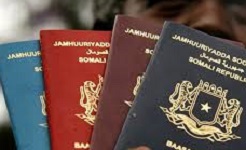Policymakers attending the meeting that discussed the partnerships for a free and regulated movement of people in Africa called for stronger collaboration between relevant institutions and governments to address the problems of migrant workers on the continent.
Speaking at the meeting held on 25 February, Ms Thokozile Ruzvidzo, Director of the Gender Poverty and Social Policy Division at ECA said that creating a sustainable environment where African citizens can move inside the continent would not only create the highly needed jobs but also would attract the high levels of trade and development.
“African migrants’ destinations are overwhelmingly not to Europe or North America, but to each other’s countries, said Ms Ruzvidzo. “Between 2000 and 2020 the number of inter-Africa migrants in Africa increased from 15 million to 25 million across Africa”, she stressed.
Mr Moussa Oumarou Deputy Director-General for Field Operations and Partnerships of the International Labour Organization (ILO) also stressed how migration has the potential of reducing youth unemployment by contributing to economic development through remittances and by importing skills, knowledge and technology to both the countries of origin and destination.
The meeting took place after the long-awaited implementation of the African Continental Free Trade Area (AfCFTA) that began on 1 January 2021, marking a very important milestone for African trade and free movements of people
The implementation of the AfCFTA protocol on the Free Movement of People matters because at present, travelling between African countries, for Africans, is very difficult. The COVID-19 pandemic made it harder when several countries imposed restrictions on cross-border travel.
ECA argues that implementing the Free Movement Protocol will allow young people to move to where there is a need for their skills and talents. The high numbers of new entrants into the workforce and the slow rate of job creation mean that there are a lot of unemployed skilled people across the continent, yet at the same time, many countries are suffering from serious shortages of qualified employees.
Mr Raymond Gilpin, Chief Strategy Analysis and Research Team at UNDP Africa said that creating effective partnerships towards preempting and regulating the migration flows inside and outside the continent is paramount. He added that such partnerships would ensure that the labour laws are in place and applied to guarantee the safety and security of all the migrants’ workers.
The meeting was organized by the Institute for Economic Development and Planning (IDEP), a Senegal based institute of the UN Economic Commission for Africa (ECA) which supports African countries in their quest to build their human resource capacities.
The virtual gathering attracted officials from governments, civil society, academia and the private sector and was held in the context of the Seventh Session of the Africa Regional Forum on Sustainable Development.

